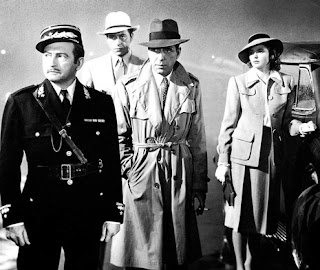SPOILER ALERT! The plot of the movie will be discussed.
My favorite line from the movie is delivered by Rick
(Humphrey Bogart). When he is asked why he came to Casablanca , he says it was “for the healing
waters.” When it is pointed out that the city is in a desert, Rick responds by
saying, “I was misinformed.” In that one line we sense the mystery that
surrounds Rick. The film provides a slow reveal of who he is. We hear people
talking about his club and what his past might be. Even the first shot of him
has the camera move from his hand signing a note, up the white jacket sleeved
arm to finally rest on his face. His enigmatic response about his being in Casablanca shows the wall
he has erected between himself and others. His line is also funny, and there
are many of them in this film that has a dark edge to it.
Who is the true hero of this story? Many could say it is
Victor Lazlo (Paul Henreid). He is a Czech resistance fighter who has rallied
multitudes with his moral leadership to battle German tyranny in Europe . He was incarcerated in a concentration camp
before escaping. He is in Casablanca , as are
numerous others, hoping to get letters of transit so that he can fly to Lisbon with his wife, Ilsa (Ingrid Bergman), and then
reach America .
But, even in Casablanca
he puts his life at risk. He defies the German officers when he orders Rick’s
house band to play La Marseillaise to
remind the French in Casablanca of the need to
preserve their country against the compromises yielded by the Vichy government. He meets with the local
resistance members to encourage them to keep up the fight against the Nazis.
Rick is the main character in the plot, but is he a hero? We
learn that in the past he helped in the fight against fascism, always siding
with the underdogs. But, he felt betrayed by the love of his life, Ilsa, when
she didn’t show up at a train station in Paris
on the day they were supposed to leave the city to flee the Nazi onslaught.
Perhaps he chose Casablanca ,
not for “healing waters” but for just the opposite reason – because its desert
and the hopeless people staying in the city reflect the barrenness of his
cynical soul. He has become a person who says he sticks his neck out for nobody
and that “I’m the only cause I’m interested in.” He has no allegiance to any country. This
fact is illustrated when Major Strasser asks him his nationality, and Rick
responds by saying “I’m a drunkard.” He now collaborates with criminals, such
as the one played by Peter Lorre, and corrupt officials like Captain Renault
(Claude Rains), who collaborates with the Nazis and takes advantage of women
seeking escape from Casablanca.
But, even though he is angry at Ilsa, he still admires
Lazlo. The latter says that he tries to help the cause. Rick says, “Many try.
You succeed.” It’s as if Lazlo’s presence and actions in Casablanca awaken in Rick the importance of self-sacrifice
and the nobility of working for a cause. After Rick finds out that Ilsa thought
her husband was dead when they were together in Paris , and only left once she found out Lazlo
was alive, he sees that she still loves him. His cynicism melts away. He is the
one who allows the band to play the French anthem. He then rises to Lazlo’s
level by sacrificing his love for Ilsa, putting her on the plane with her
husband because he knows that Lazlo needs her. Rick is willing now to join the
resistance. As Lazlo says to Rick, “Welcome back to the fight.” That is why
Rick says that their lives don’t amount to “a hill a beans” in the larger
context of the world’s problems.
So, one could say that Lazlo is the model others must
emulate to become heroes. You can see Ilsa’s admiration for him in her eyes.
But ideals are abstractions, and hard to touch. For example, Ilsa never kisses
him on the lips. Rick is more like the type of hero that the rest of us hope to
become. He is someone who feels love, anger, hurt, and jealousy, but he can
transcend his self-centered life to perform heroic actions when the chips are
down. Perhaps he is symbolic of the United States , which has had to
overcome the comfort of isolationism to join the world in the fight against
totalitarianism.
Lazlo’s heroism flows to others in the film, including those
singing at Rick’s club, and the other resistance fighters. Even Captain Renault
catches the patriotic fever, joining Rick at the end to form their “beautiful
friendship.”
Next week’s movie is On
the Waterfront.









Lazlo was the "ideal" that inspired admiration but Rick was the "bad boy" who inspired passion...and so it goes.....
ReplyDeleteI think you summed up the differences very well.
ReplyDelete